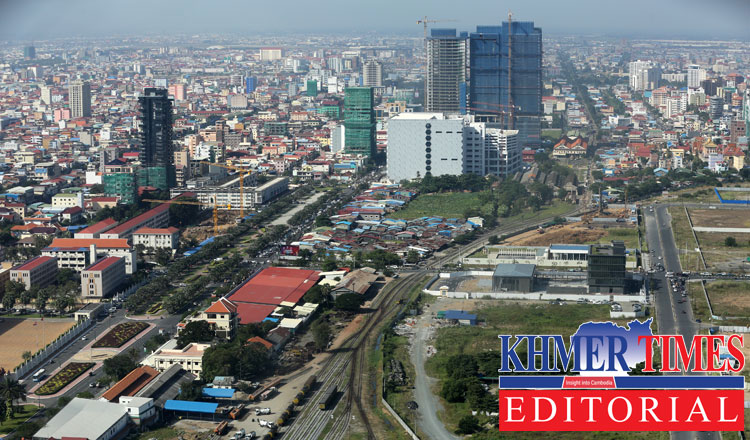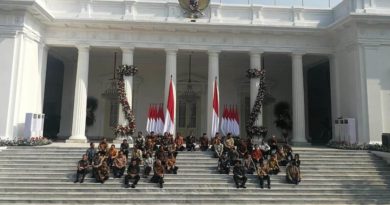EDITORIAL: Cambodia: NGOs economy and its downside effects
.

At the current context of development, except for humanitarian NGOs, NGOs should try to modernise and Cambodianise themselves to become for-profit organisations that can be self-sustained. With rapid economic growth, coupled with the global “aid fatigue” when some donors are phasing out their assistance or shift their funds to other prioritised countries, people have started to question the sustainability of NGOs economy.
Cambodia has always been an NGOs paradise as a legacy of the United Nations Transitional Authority in Cambodia (UNTAC) in early 1990s. Beung Keng Kong area used to be the mecca of foreign NGOs and their staff but such nostalgy has been changed since the early 2010s as the area has been transformed into prime business and leisure location frequented by both foreigners and locals.
NGOs have played an important part in the development of Cambodian socio-economy, especially in terms of bridging the development gap to cover those whom the government and private sector cannot reach out to due to policy and resource limitation. The number of NGOs in Cambodia can be mindboggling, no less than 5,000, if compared to any countries with similar development status. If one NGO requires $50,000 for annual office and project operation, then it would mean the NGO industry is running at least $250 million budget per year.

Apart from their socio-economic contribution, there are also some downside effects of NGOs economy that are critical to Cambodia’s self-reliance, future development, national sovereignty and self-esteem.
Firstly, aid sustainability can obstruct other aspect of new development or economic sector. To justify financing, reports of the issues must be serious in terms of urgency and needs but it can also prevent other development possibilities. For example, if we report that Cambodia’s landmine issues are extremely serious, then there might be some potential investors and tourists who ask whether it is safe to conduct business in Phnom Penh or visit Siem Reap. It is a fact that there are investors and tourists who raised such question.
Secondly, in terms of salary and positions in foreign-funded NGOs or international NGOs, there is a non-written discrimination between local and foreign staff that is not based on meritocracy but based on nationality. It is a general observation that Cambodian staff, regardless of their qualifications, would never attain the salary range of foreign experts, and they are unlikely to reach managerial positions. It is also common that the salary of foreign experts and consultants often take the large chunk of project finance leaving little benefit to local staff and domestic economy. And local talents, regardless of their capability, are unlikely to be recruited as lead experts or consultants.
Thirdly, as non-profit organization, the rationale of NGOs’ budget operation is to utilise all available fund annually, otherwise the budget will be cut short in the next budget planning and proposals. Thus, this operational drive does not encourage NGOs to save the budget for future capital investment to ensure self-sustainability. NGOs think only about how to spend effectively all the available funds instead of how to save for the future.
Fourthly, some NGOs are serving the agenda of foreigners instead of local development agenda. With more than 5,000 NGOs, Cambodia can be seen as one of the freest in terms of NGOs freedom. But on the other hand, Cambodia can also be seen as having too many legal loopholes for NGOs and foreigners to exploit the luxury and freedom, and to interfere in Cambodia’s domestic affairs.
Some NGOs serve foreign interest and agenda through advocacy of “human rights supremacism”, “green protectionism” and “development obstructionism” without respect of local culture, respect for domestic laws, development needs and national context. Examples can be found even beyond Cambodia.
“Human rights supremacism”: for examples, some NGOs use the Western standard that worships “individual freedom” to criticise Asian countries’ inclination to prioritise public interest. Finland and the Human Rights Watch criticised Cambodia’s Covid-19 measures as being too restrictive based on their own supremacist Western standard and values without due respect to the cost of local lives that need higher protection than “individual freedom”.
“Green protectionism”: for instance, there are NGOs who claim that Indonesia and Malaysia are conducting deforestation for the palm oil plantation, and thus provide justification for the European Union to impose sanction on Indonesia and Malaysia’s palm oil products. In this case, environment was used to serve the protectionist agenda of foreign states.
.

“Development obstructionism”: for instance, there are NGOs in Laos who calculate the area of forest that had been cut down to construct the longest railway line that the country ever had. One would have wondered whether Laos should preserve the forest for the animals or they should build the railway to transport goods and people and to boost the economy of one of the poorest countries in Southeast Asia. There are NGOs who obstructed the construction project of Neak Loeung bridge in Cambodia for possible impact on endangered turtle species. Again, the question arises as to whether one should protect several turtles or to build the long-overdue missing link that connect the so-called ASEAN highway all the way from Bangkok to Ho Chi Minh, not to mention the local people’s universal dream of having bridges to cross the river or connect their country’s landmass.
.

Fifthly, some NGOs lack transparency and accountability. These NGOs complained even on the simple legal requirements of Cambodia that are ubiquitous in the world: activity reporting, and financial reporting. Some NGOs lacks core competence and clear scope of works. With only a few staff, they seem to cover every social issue without clear professionalism, and technical expertise, ranging from anti-corruption to environment, electoral prediction and observation, to land issues, to labor rights. Some of their directors can also work as real estate brokers and advisors for private companies. This is truly unprofessional but unfortunately they seem to enjoy special legal privileges under the “human rights shield” even if they violate the law, and there are always foreign embassies and funders who act like their protectorates to help them or even provide them political asylum, defying Cambodia’s efforts to strengthen the rule of law.
The above downside effects give little optimism that NGOs paradise would sustain in the long run in Cambodia, not because of the government’s restriction but because of the market and development drive and the donor’s aid-fatigue. Some NGOs will disappear in the near future, and those who wish to sustain need to transform into profit-making instead of relying on charitable funding alone. There are examples of professional NGOs that have turned themselves into private corporates, and they even thrive and contribute greatly to local economy. They are also successful in their effort to Cambodianise the operation and leadership. For example, ACLEDA Bank and the Cambodian Center for Study and Development in Agriculture (CEDAC).
Surely, the NGOs themselves are conscious of this survival crisis that requires them to adapt to fit with the ever changing economic and development landscape.











